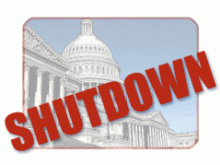With lawmakers unable to make a deal on how to fund the government, federal agencies began a partial shutdown on Oct. 1.
The government closure should not hit doctors in the pocketbook. Medicare is expected to continue "largely without disruption" in the short term, according to the Health and Human Services department contingency plan for operating during a shutdown. Payments for Medicaid and the Children’s Health Insurance Program should also be unaffected, since federal monies for that program were previously set aside.
But the shutdown will impact many of the day-to-day functions at federal health agencies, from grant making to disease surveillance.
Doctors and other health care providers at the National Institutes of Health continue to care for current patients but are now unable to admit new patients unless it is deemed medically necessary by the NIH director. The agency is providing only minimal support for ongoing research protocols and has halted approval of new grant applications.
Some staffers at the Centers for Disease Control and Prevention are on duty to respond to disease outbreaks and other emergencies; however, seasonal influenza monitoring is on hold, as is technical support to states for infectious disease surveillance.
The Vaccines for Children program, mandated by law, continues despite the shutdown.
Graduate medical training at children’s hospitals is on hold since the Health Resources and Services Administration cannot make payments to the Children’s Hospitals Graduate Medical Education Payment Program during the shutdown.
Health care advocacy groups began sounding off Oct. 1 on the shutdown’s impact on public health.
"We encourage policymakers to consider the dramatic impact that funding cuts to medical research and doctor training will have on the health of the country and the millions of patients who depend on the lifesaving research conducted at, and critical health care services provided by, the nation’s medical schools and teaching hospitals," said Dr. Darrell G. Kirch, president and CEO of the Association of American Medical Colleges.
In the meantime, despite the government shutdown, enrollment in the Affordable Care Act’s health exchanges began as scheduled.


